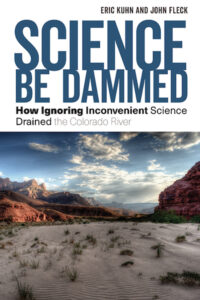 One plus one equals two.
One plus one equals two.
Two plus two equals four.
Regardless of how much you want it to, or how zealously you try to make it do so, one plus one will not equal three, nor will two plus two equal five. Math just doesn’t work that way.
Another way that math doesn’t work is, for example, say a team of scientists tell you that a million gallons of water flows through a particular river each year. A down-river city you’d like to build, for which that river is planned to supply all the needed water, will require two million gallons from it each year. You shove that little bit of information aside and tell all your financial backers “Yep! We’ve done the math!” (leaving out that the math you did gave you an answer that was inconveniently the opposite of the one you wanted).
As Eric Kuhn and John Fleck explain in their new Science Be Dammed; How Ignoring Inconvenient Science Drained the Colorado River, this very over-simplified hypothetical example underlies the present day problems now facing that once great river. “Contrary to a common myth that the authors of the Colorado River Compact did the best they could with limited information, […] development boosters selectively chose the information needed to support their dreams, ignoring inconvenient science that suggested a more cautious approach.”
